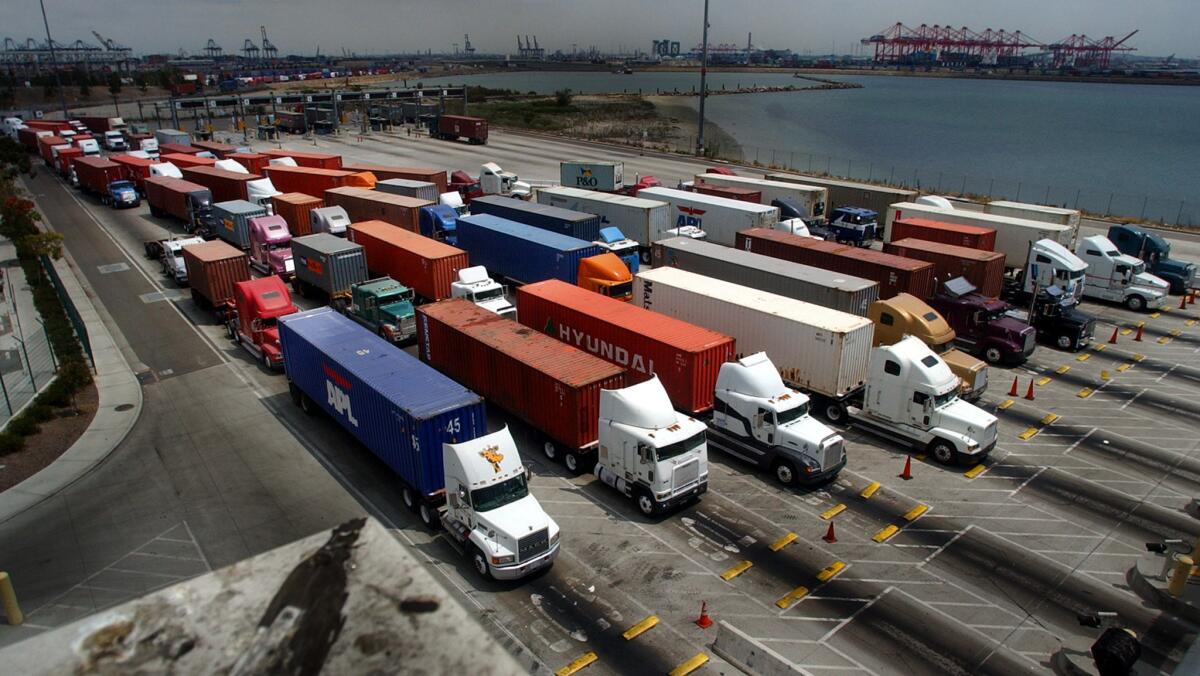Gig law doesn’t apply to independent truck drivers, California judge rules

California’s new gig-economy law does not apply to the thousands of independent truck drivers in the state because the controversial measure is preempted by federal law, a Los Angeles County Superior Court judge has ruled.
The state law, known as Assembly Bill 5, or AB 5, was intended to curb businesses’ use of independent contractors by establishing a test that effectively makes it harder for companies to claim that workers are independent contractors instead of employees who are entitled to legal minimum-wage rates and benefits such as workers’ compensation.
Two years ago, Los Angeles City Atty. Mike Feuer sued three port trucking companies owned by NFI Industries, alleging that the businesses exploited their drivers by misclassifying them as independent contractors and making them absorb thousands of dollars in costs that should be borne by employers.
Ruling in that case, Judge William Highberger wrote Wednesday that owner-operator truck drivers should not be reclassified as employees under AB 5 — or under the so-called Dynamex court decision on which AB 5 is based — because those developments are preempted “by an act of Congress.”
California companies are scrambling to figure out how AB 5, a sweeping new hiring law, affects them.
The new California rules “clearly run afoul” of a 1994 federal law regulating interstate commerce that provides “a uniform rule to apply in all 50 states,” Highberger wrote in his 18-page ruling.
“We are appealing the court’s decision,” Feuer said in a statement Thursday, noting that Highberger wrote in his ruling that “there are substantial grounds for difference of opinion.”
That’s not the only litigation involving truckers, who are key players in moving goods in and out of the twin ports of Los Angeles and Long Beach.
A federal judge recently issued a temporary restraining order in another case, this one brought by the California Trucking Assn. to stop California from applying AB 5 to the trucking industry. A hearing to consider whether a preliminary injunction should be granted in that case is scheduled for Monday.
The Teamsters union supports California in that case, and Julie Gutman Dickinson, a partner at the law firm Bush Gottlieb who represents the Teamsters Port Division, called Highberger’s ruling “wrong” and said there would continue to be “lengthy legal proceedings before there is any final determination” about whether AB 5’s test would apply to truck drivers.
She also said in an email that even if the AB 5 test was ultimately found to be preempted by federal law, truck drivers “have been uniformly found to be employees” under the so-called Borello test, a reference to a 1989 decision by the California Supreme Court involving grower S.G. Borello & Sons.
But Highberger’s ruling was praised by Joshua Lipshutz, a partner at the law firm Gibson, Dunn & Crutcher, which represented NFI Industries and its subsidiaries Cal Cartage Transportation Express, CMI Transportation and K&R Transportation California.
“This is a win for trucking companies and independent truckers nationwide,” Lipshutz said in a statement. “Judge Highberger’s decision confirms that California cannot simply eliminate that business model and force truck drivers to be employees.”
More to Read
Inside the business of entertainment
The Wide Shot brings you news, analysis and insights on everything from streaming wars to production — and what it all means for the future.
You may occasionally receive promotional content from the Los Angeles Times.












